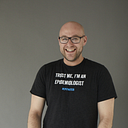Member-only story
Drinking Coffee Still Won’t Save Your Life
What happens when the media gets a hold of observational research

Getting a coffee in the morning is something of a magical experience. Walking up to the machine, barista or (god forbid) instant, smelling that rich, dark brew, taking the first caffeine-filled sip, draining the last bittersweet drops from your mug. Finally managing to properly open your eyes as the last fog of sleep is chased away by the sultry brew.
Coffee is great.
And we love it. Worldwide, more than 2.25 billion cups are drunk each day, with the average person in the US drinking more than 100 litres each year.

So it’s no surprise that we are interested in the health impacts of coffee. It’s even less surprising that every time a study comes out the suggests that coffee is good for us, we jump on the idea because it’s exciting to think that that morning cup of joe might not just be making our work better it might also be saving our lives.
Enter the newest study making headlines. If the media stories are to be believed, drinking coffee doubles the chances of survival for people who have HIV. That sounds pretty freaking amazing.
Sadly, it’s a bit more complicated than that.
The Study
The study that all of these headlines are referring to was an analysis of a large French dataset of patients infected with both HIV and the hepatitis C virus (HCV). Basically, the researchers looked at about 1,000 people, divided them up by how much coffee they drank, and found that people who drank an elevated amount of coffee — defined as more than 3 cups per day — had a 50% reduced risk of dying over the course of the 6 years of the study.
They also made this nifty graph to show the effect:

Drink more coffee, die less. It sounds pretty rosy, right?
